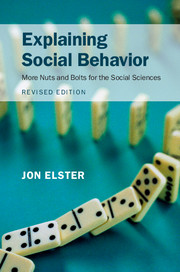Book contents
- Frontmatter
- Dedication
- Contents
- Preface
- I Explanation and Mechanisms
- II The Mind
- III Action
- 10 Constraints: opportunities and abilities
- 11 Reinforcement and selection
- 12 Persons and situations
- 13 Rational choice
- 14 Rationality and behavior
- 15 Responding to irrationality
- 16 Implications for textual interpretation
- IV Interaction
- Conclusion: is social science possible?
- Index
14 - Rationality and behavior
from III - Action
Published online by Cambridge University Press: 05 August 2015
- Frontmatter
- Dedication
- Contents
- Preface
- I Explanation and Mechanisms
- II The Mind
- III Action
- 10 Constraints: opportunities and abilities
- 11 Reinforcement and selection
- 12 Persons and situations
- 13 Rational choice
- 14 Rationality and behavior
- 15 Responding to irrationality
- 16 Implications for textual interpretation
- IV Interaction
- Conclusion: is social science possible?
- Index
Summary
Ignoring the costs of decision making
The idea of rationality has a strong normative appeal. We want to have reasons – desires and beliefs in light of which the action appears as rational – for what we do. In fact, our desire to act for a reason – our deference to rationality – can be so strong as to induce irrational behavior. We may define hyperrationality as the propensity to search for the abstractly optimal decision, that is, the decision that would be optimal if we were to ignore the costs of the decision-making process itself. These costs are of three kinds: (1) the cost of the means of deciding, (2) the cost of the side effects of deciding, and (3) the opportunity costs of deciding, that is, the value of the other things one might have done instead of going through the decision process. Let me illustrate them briefly.
Hyperrationality through neglect of (1) could arise in comparison shopping when the (expected) savings from finding the lowest price is less than the money spent on transportation traveling from store to store. Tourists in the south of France cross the border to Spain to buy cheap cigarettes as if gasoline were free. Neglect of (2) could induce hyperrationality in contested child custody cases. The court may try to promote the interest of the child by determining which parent is more fit for custody. Once that issue has been settled, the court has a good reason for awarding custody to that parent. In the juridico-psychological process of ascertaining relative fitness, however, incalculable damage may be done to the child. A more rational procedure, given the aim to be achieved, might be to flip a coin or retain the traditional presumption of maternal custody.
Neglect of opportunity costs is illustrated in an observation by Dr. Johnson in a conversation with Boswell about which subjects children should be taught first: “Sir, it is no matter what you teach them first, any more than what leg you shall put into your breeches first. Sir, you may stand disputing which it is best to put in first, but in the mean time your breech is bare. Sir, while you are considering which of two things you should teach your child first, another boy has learnt them both.”
- Type
- Chapter
- Information
- Explaining Social BehaviorMore Nuts and Bolts for the Social Sciences, pp. 255 - 269Publisher: Cambridge University PressPrint publication year: 2015



